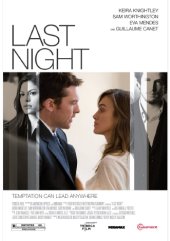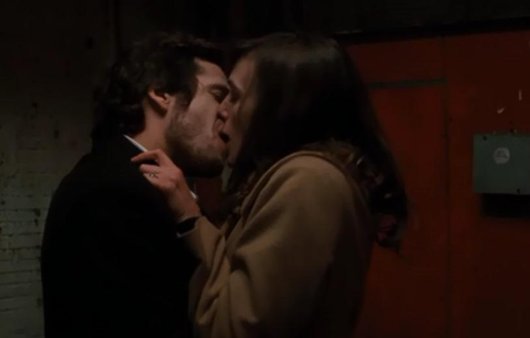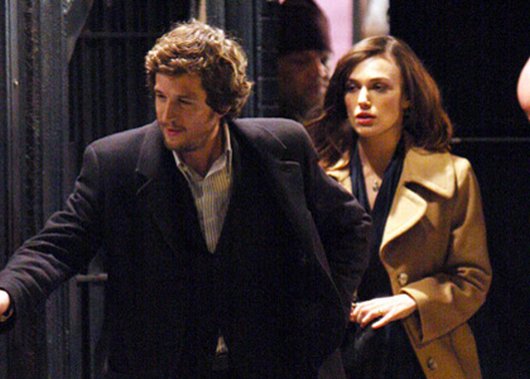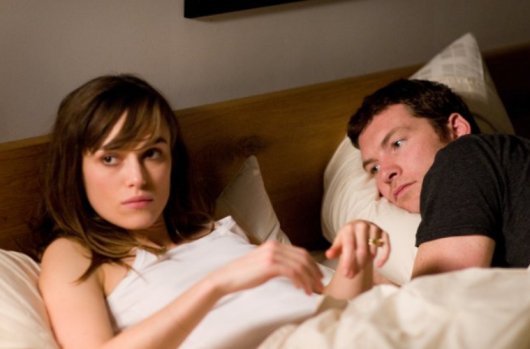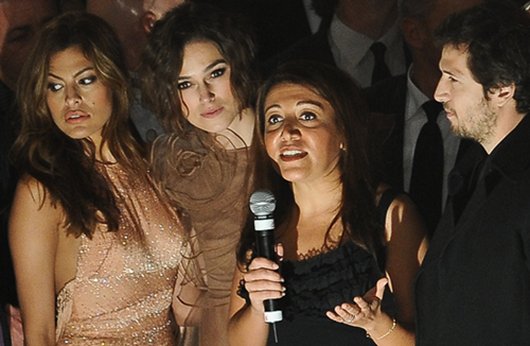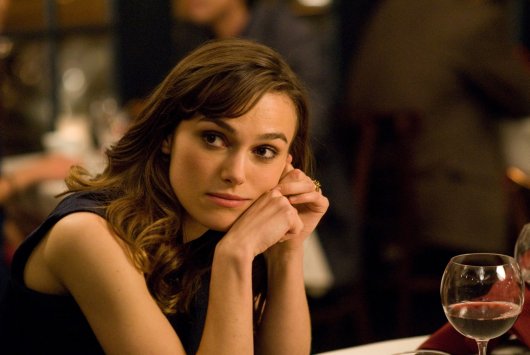
Jung at Attention
by ALEX CARNEVALE
A Dangerous Method
dir. David Cronenberg
94 minutes
 The appeal of a fine Jewish woman, the unshiksa, is well known throughout the centuries. Somehow Jesus avoided the temptation, but basically no one else did. Perseus, as he crossed the Grecian plain, had on his mind only a trick named Sheila Wasserstein, who he planned to maybe hang out with and see a movie at some point down the road. When he visited the cinema with his gentile girlfriend, all she did was hold his hand.
The appeal of a fine Jewish woman, the unshiksa, is well known throughout the centuries. Somehow Jesus avoided the temptation, but basically no one else did. Perseus, as he crossed the Grecian plain, had on his mind only a trick named Sheila Wasserstein, who he planned to maybe hang out with and see a movie at some point down the road. When he visited the cinema with his gentile girlfriend, all she did was hold his hand.
In ensuing years, we can only guess how many gentile lives unshiksas like Scarlett Johannssen and Lizzy Caplan have ruined. Ryan Reynolds wakes up every night in a damp sweat, and he doesn't have the knowledge that he is a prominent psychologist in turn of the century Zurich to quell his innate fears. Instead he's just a fucking actor.

In David Cronenberg's new film A Dangerous Method this Jewish ingenue, Sabina Spielrein, is portrayed by Keira Knightley. To make you forget this is the Keira Knightley who has had an agent since she was six years old, she adopts a slight Yiddish accent. She tells her psychiatrist Carl Jung (a childlike Michael Fassbender) that she enjoys adopting a pose in which she kneels and simultaneously attempts to defecate and stop herself from defecating. I tried this after the movie was over and it didn't end as well for me as it did for Keira.
Watching Keira Knightley try to play the part of psychotic Jewish mistress/patient, who, after she is cured, attempts to become a psychiatrist herself, is just as anguishing as it must have been for her to try to play the role. She is working so hard to be a serious actress, to live up to the potential of her part, that she eventually wins us over through sheer force of effort. Her accent is pure shit, and her manic facial expressions are something of a disaster, but who cares? Verisimilitude has never drawn at the box office.

Keira comes into Jung's life, frothing at the mouth, bursting out of her restraints because of the humiliation she suffered at the hands of her father. Jung is in contrast the nicest man she has ever met, played by the magnetic Fassbender as a naive-do gooder turned hypocrite. Jung initially struggles as he tries to cure her madness, almost crying when she refuses his jacket on a cold day.
After he makes a mentor/protege visit to the father of his field, Sigmund Freud, it takes Keira about ten minutes of screen time to not only cease her illness, but take up the task of psychoanalysis herself. It's only the tendency of Knightley to slightly jut her jaw out that lets us know she's still a crazy nutbag. Naturally, the married Jung finds his gorgeous Jewish patient irresistible, either as a consequence of Freud's method or in spite of it. Her bushy eyebrows — Cronenberg's idea of a Semitic affectation — do nothing to dim her appeal to the entranced analyst.
 the tweezer was invented in 1994
the tweezer was invented in 1994
Viggo Mortensen was Cronenberg's second choice for Freud (after Christoph Waltz), and his laconic portrayal is more along the lines of what we expect in a period film. The action is set in a Swiss hospital around the turn of the century, and we meet Freud when Jung appears in Vienna for a visit. The two bray and honk at each other for 13 straight hours, detailing their hopes and dreams for the future of their profession. Their discussions come across more as impassioned exclamations of pop psychology than serious discourse. Either that, or there is no such thing as psychology, only pop psychology.
It doesn't take long for the younger doctor to be uncomfortable in Freud's shadow. Freud sends him a lecherous patient (a scene stealing Vincent Cassel) and Jung manages to not only worsen his condition, but allows him to escape the sanitarium. Jung speculates that Freud is so obsessed with sex because he doesn't get any, and almost immediately begins to disregard his mentor's advice in favor of a spiritual understanding that will allow his patients — and himself — to escape the roles life has written for them.
 around 1902 a public HJ from your pregnant wife was de rigeur
around 1902 a public HJ from your pregnant wife was de rigeur
Jung is married to a rather boring gentile woman who has a lot of money. She buys him a lovely estate, and also a cute sailboat. They take naps in the cabin together like chaste siblings. It is never mentioned that she herself also became an analyst. Even after ten years have passed, they don't age her with makeup one bit, so as not to give Jung any excuse whatsoever for cheating on her so flagrantly, for not exhibiting the slightest bit of guilt. She is simply an unwanted beautiful thing.
Carl takes out his frustrations on his Jewish friends. Henry Kissinger is not available and The Prince of Tides hasn't yet hit local theaters, so Freud himself bears the brunt of his anguish. (I'm not sure what I was doing, probably practicing my jiu-jitsu.) There is never a shouting match between Freud and Jung. The most evocative moments of conflict occur in monotone readings of their letters to each another, which is great fodder for blog posts, but somewhat inadequate for a visual medium.
 Freud's wife bought him a toy sailboat
Freud's wife bought him a toy sailboat
When the two eventually reunite for a trip to America, Freud believes the closeness between him and Jung will not ebb, and is shocked that Jung's wealthy wife has booked him a first class cabin while he labors away on a manuscript in the middle decks. Celine Dion refused to score the soundtrack unless Cronenberg apologized for making his 1999 film eXistenZ, so no music outside of a random note here or there adorns the ship's arrival in Manhattan.
 near, far, wherever you are
near, far, wherever you are
Instead of watching the two psychoanalysts stroll the streets of SoHo, it's back to Europe again. Cronenberg's disgust for the period makes A Dangerous Method more amusing than the staid stage play it is based on. He doesn't bring the past to life, quite the contrary: he murders it again and again. Europe holds no glory for him; even a magnificent Swiss vista absorbed by Jung in his waning years symbolically represents only another personal tragedy. The fact that Europe is so much older than his own country is a point of regret, not an enticing feature of its history. In this landscape, we are forced to be continually reminded of that continent's many disappointments, foretelling the genocide to come. (Sabina Spielrein herself was ended by a SS death squad.)
Strangely, Freud comes across as the only sympathetic figure in the film. This is half due to Viggo's dreamy, sad eyes, and half a consequence of the fact that he is the only person in the film not to behave abominably. In fact, he doesn't behave at all — he smokes over 82 cigars in the movie, one for every scene he is in (I counted out of boredom) and the only time he moves more than an inch is when he collapses after a panic attack. The idea is to subtly associate the staidness of his psychoanalytic viewpoint with his literal motion, but the end result is so dull you can't properly appreciate the meme.
 a relationship that spans space and time
a relationship that spans space and time
I don't know why Cronenberg, usually the purveyor of such cinematic excitement, tension and pain, chose this project. Perhaps he wanted to zig instead of zag. A sanitarium would seem to be the perfect setting for scares and frights, and none are in evidence here. There is nothing to suggest that the same man who directed A Dangerous Method also wrote and directed a horror film about the psychosomatic offspring of a mutant woman, or one about sex after car crashes. The underlying message here is that none of us can afford to live in the past; as Jung himself puts it in the film's final scene, "Sometimes you have to do something unforgivable just to be able to go on living."
Until the very end of A Dangerous Method, Cronenberg resists nearly all the trappings of period films: the maudlin crossfades, the montages connoting the passage of time, the dreamy/sweeping score, the Mad Men trope of exposing the outrageous conventions of the time to modern eyes. Cronenberg prefers instead to focus on the psychic unraveling of deeply misguided individuals. It's true that this has been his subject before, but the analysis never came to such a hopeless conclusion.
Alex Carnevale is the editor of This Recording. He is a writer living in Manhattan. He tumbls here and twitters here. He last wrote in these pages about Lars Von Trier's Melancholia. You can find an archive of his writing on This Recording here.

"Cut Me Out" - MNDR (mp3)
"I Go Away" - MNDR (mp3)
"Jump In" - MNDR (mp3)
 historical moment as sabina receives first ever crap e-mail from a dude
historical moment as sabina receives first ever crap e-mail from a dude
 FILM
FILM  Tuesday, December 16, 2014 at 10:13AM
Tuesday, December 16, 2014 at 10:13AM 














































